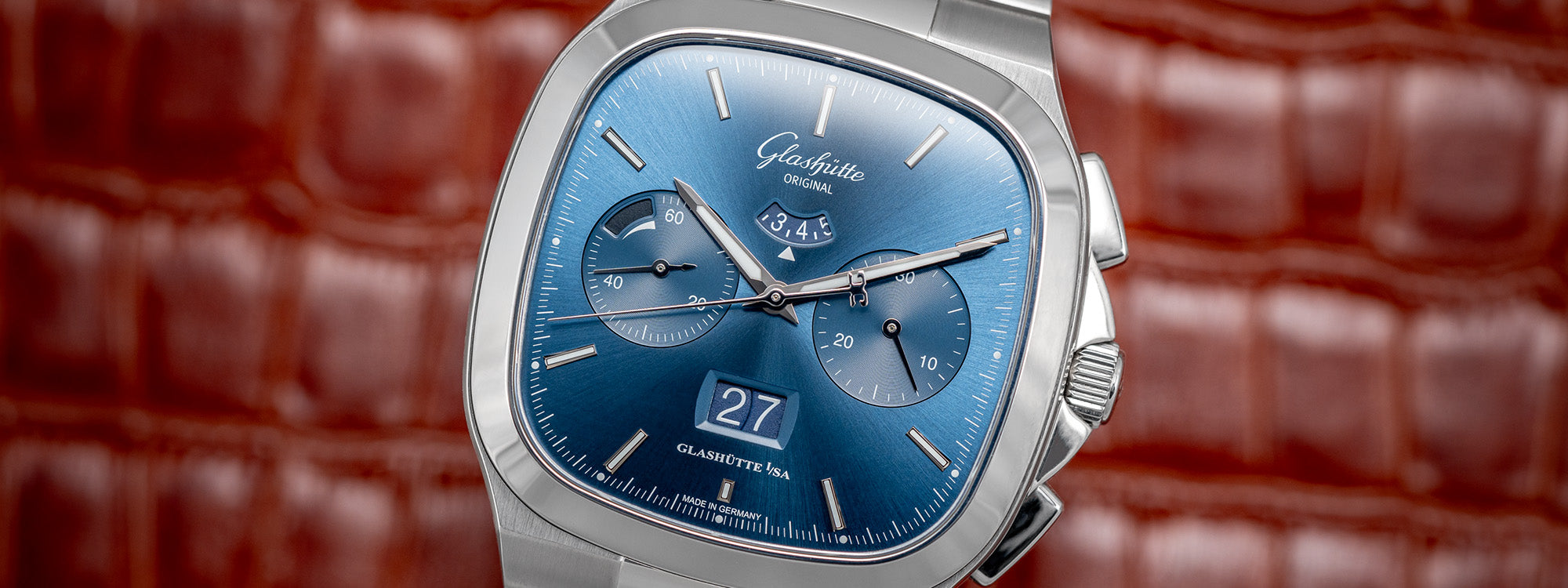Glashütte Original’s Seventies collection is one of the two pillars that make up the German maker’s Vintage series, which pays tribute to the distinctive designs of two seminal decades in watchmaking, the 1960s and 1970s. Whereas the Sixties branch of the family is notable for more traditional, rounded cases, the Seventies watches stand apart, not just from the rest of the Vintage models but from the entirety of the Glashütte Original portfolio, with their softly squared “TV”-style cases, a hallmark of timepieces from that eponymous decade.

The Seventies — like the Sixties, initially positioned as part of Glashütte Original’s Senator collection before becoming a Vintage model — debuted in its simpler, three-handed iteration in 2011, with the Chronograph following in 2014. In recent years, the original appears to have been gradually phased out (it’s no longer featured on G.O. 's website) to make way for more colorful and creative versions of the Chronograph, like the version with a sunray-finished, “Radiant Blue” dial featured here. This may have been a wise decision, as it is the more complicated model that brings more of the Saxon brand’s familiar formula to the table — namely, retro charm mixed with avant-garde modernity. Despite its era-evocative name, and many of its aesthetic hallmarks, the Seventies Chronograph Panorama Date is a watch that is decidedly at home in the 21st Century.

As Exhibit A, take the large, rectangular “Panorama” date display referenced in the model’s name, which occupies the 6 o’clock position — an emblematic element of the Glashütte Original brand that did not exist (or at least wasn’t common) in the 1970s watches that inspired this one, made by the state-owned GUB in the days before German reunification. Exhibit B can be found directly above the big date, below the brand logo at 12 o’clock: a semicircular window with an arrow pointer that offers a view of the rotating disk, numbered 1 to `12, that tallies the chronograph’s elapsed hours. This more understated staging stands in for the more conventional subdial counter that you’d find on most chronographs, whether they’re from the ‘70s or today. Additionally, even the dial’s more traditional counters offer a little something extra: the 9 o’clock subdial makes room for a power-reserve indicator in addition to its primary function of displaying the running seconds.

This is not to infer that the watch is in any way misnamed, or lacking in retro ‘70s characteristics. Most prominent among these, of course, is the 40mm x 40mm, softly curved yet angular case shape, made of stainless steel with a combination of satin-brushed and polished finishes. No, it doesn’t really resemble a “TV” that one would find in most homes these days, but it certainly does recall the look of an older one from the infamous “Me Decade” — one upon which some might even remember watching All in the Family, MASH, or the Watergate hearings back in the day.

The simple baton hour markers, sharply pointed hands (all luminous-treated), and printed minutes scale — along with the Chiclet-style extended buttons that flank the screw-down crown and activate the chronograph — are also details one might encounter in vintage chronograph wristwatches from the 1970s. The uppermost button controls the stopwatch’s starting and stopping, while the lower one activates the flyback function that instantly returns the central chronograph seconds hand to zero to begin timing another interval.

The case measures a relatively substantial 14.4mm thick and resists water pressure to 100 meters. Its back side features a sapphire window that offers a view into the in-house movement, the self-winding Caliber 37-02, equipped with a column-wheel chronograph mechanism, a 70-hour power reserve stored in a single barrel, and a bidirectional rotor with a partially skeletonized design to wind the movement. Glashutte Original has designed the 4-Hz movement so that its regulation takes place via four gold screws on the balance rim rather than via the balance spring, which allows continuous running for a longer period of time.

As per usual with Glashütte movements, the appreciation of this one is as much about design and decoration as it is about technical virtuosity. Caliber 37-02 uses a three-quarter mainplate, a traditional element of Saxon horology going back to its beginnings more than 175 years ago, to anchor its rotor and chronograph bridges. The mainplate, the automatic bridge, and the rotor are embellished with Glashütte stripes, a motif similar to the elegant “Geneva waves” prevalent on high-end Swiss-made movements. Blued screws, which achieve their hue through a precisely regulated heat-treating, are strategically placed throughout the movement, connecting vital parts while simultaneously adding a pop of color. The aforementioned rotor has a weight made of 21k gold and features the maison’s “Double G” logo in the center.

The Seventies Chronograph Panorama Date is available with four different wrist-wear options: straps in brown calfskin leather or blue Louisiana alligator leather; another strap in sporty black rubber; and — perhaps most period-appropriate for a timepiece whose roots are in the period that birthed the integrated-bracelet sport-luxury watch genre — a stainless steel three-link bracelet with the same array of satin-brushed and polished surfaces as the case. It’s priced at $14,100 on the straps and $15,300 on the bracelet. Wear one of these timepieces to your next big social function and you may not actually hear "Far out, Man!" from fellow watch enthusiasts, but you will definitely get their attention.


























































1 Comment
What a fantastic piece on one of my grail watches! This watch is so original. As mentioned, not sure if the design is really “70’s” in inspiration. To me, it always felt 1930’s. Very art-deco. Love that the movement is in-house.
It will certainly attract attention in a great way. I’d had to see them in person but for now, I think the silver dial with it’s very slight copper-tint would go on my wrist!